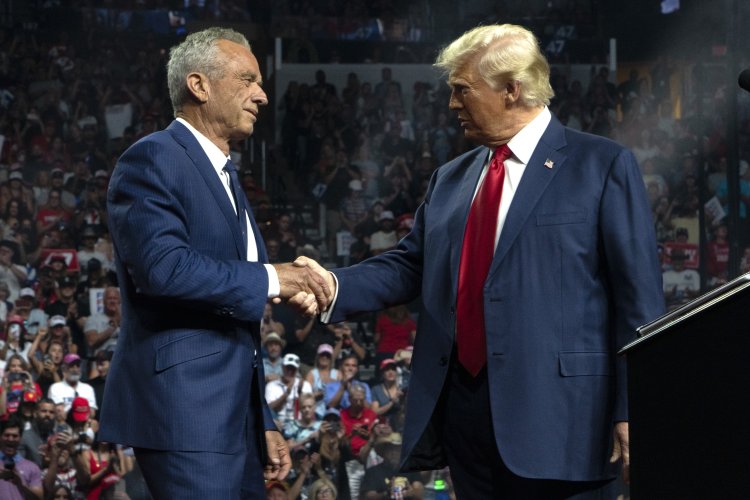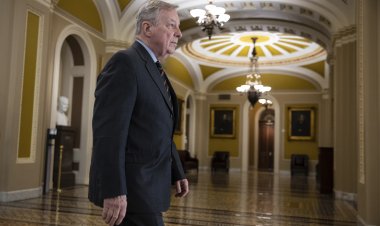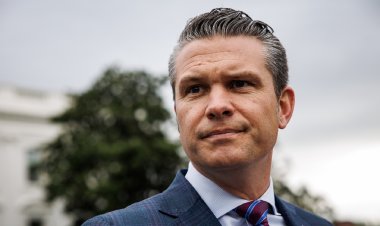Pharma's once-dominant allies in Washington are now diminishing
The industry is facing challenges in establishing its identity while Trump and RFK Jr. relentlessly criticize it.

Trump has announced intentions to impose tariffs on drug imports, while Health Secretary Robert F. Kennedy Jr. has criticized the drug industry’s profits and raised concerns about the safety of its products.
Once a formidable lobbying force in Washington, the pharmaceutical industry is now struggling to develop a coherent strategy for self-defense, as revealed by six industry lobbyists and three company officials who spoke to PMG under the condition of anonymity to discuss internal matters.
“It's just paralyzing. You don't know what's going to happen next,” remarked one lobbyist.
This situation represents a striking shift, considering the historically close relationship between the industry and Republicans. Many industry executives and lobbyists have indicated to PMG that outright opposition to Trump is unlikely to yield positive results and could jeopardize legislative victories that are essential for securing congressional support, such as the restoration of a tax break worth billions.
Pharma faces two unprecedented threats that no previous GOP president would have posed. First, Trump has expressed a desire to impose tariffs on drug manufacturers that could lead to increased medicine prices, aiming to encourage domestic production.
Second, Trump has appointed a vocal critic of the drug industry to manage the regulatory department. Kennedy has stated that the industry produces dangerous products and profits from keeping Americans dependent on them. Just this month, he asserted that agency personnel had been too compliant to pharmaceutical interests and vowed to eliminate that influence.
Kennedy has already initiated efforts to reduce the size of the Food and Drug Administration (FDA) and the National Institutes of Health (NIH). The pharmaceutical sector relies on the FDA for product approvals and the NIH for assistance in developing new treatments.
“They're juggling half a dozen different areas that could affect the size of the industry, and therefore the amount of innovation that goes on in the future,” noted John Barkett, a managing director at consultancy BRG and former advisor on drug pricing issues in President Joe Biden’s Domestic Policy Council. “I'm sure that, internally, they're doing that math, even if that's not yet informing their external approach to the administration.”
The pharmaceutical industry possesses the largest lobbying budget in Washington and employs a vast number of advocates with ties to lawmakers from both parties.
This year, major drug companies have increasingly relied on lobbyists. Eli Lilly nearly doubled its lobbying expenses in the first quarter of 2025 compared to the same period the previous year, according to federal lobbying disclosures. Companies like Pfizer and Merck have also significantly increased their contributions to lobbying efforts and engaged lobbyists with connections to Trump.
Nevertheless, lobbyists and officials told PMG that the industry has yet to finalize a strategy for engaging with the president.
One lobbyist attributed the industry's indecisiveness to fear, characterizing pharmaceutical executives as “pretty fucking scared to speak up and defend themselves.”
While industry groups have expressed moderate criticism of the agency’s downsizing, they have not taken a strong stand. Following the recent layoffs, a spokesperson for PhRMA, the brand-name drug lobby, stated that such actions “raise questions” about the FDA’s capacity to promote innovation.
In a statement to PMG on Wednesday, PhRMA spokesperson Alex Schriver emphasized shared priorities with Trump, including revitalizing American manufacturing and addressing the role of insurers, pharmacy benefit managers, and hospitals in driving up healthcare costs. Schriver affirmed that drugmakers are “committed to working with the administration” and echoed Kennedy’s goal of improving American health.
However, he did not address Kennedy’s opposition to user fee programs that fund nearly half of the FDA and which Kennedy argues compromise the agency’s integrity. These user fee programs are authorized until the end of fiscal 2027, but negotiations for their reauthorization would typically begin later this year.
A spokesperson for BIO, a group representing vaccine manufacturers and smaller biotech firms, pointed to CEO John Crowley’s warnings about the “loss of experienced leadership” at the FDA following the resignation of top vaccine regulator Peter Marks and against “indiscriminate” job cuts.
U.S. biotech “leadership has been grounded in transparency and guided by scientific rigor and expertise. We have been unequivocal on this point and have actively advocated for maintaining the expertise at the FDA and our other healthcare agencies,” the spokesperson stated. They stressed that “Predictability, transparency and consistency are essential to developing the medical breakthroughs needed by millions of Americans, and to enabling a thriving, sustainable biotech industry.”
Others within the pharmaceutical sector have spoken out against Trump’s tariff proposals. John Murphy, who leads the lobby for generic manufacturers with the Association for Accessible Medicines, warned that tariffs would threaten the financial viability of his member companies.
However, voiced concerns from branded drug companies have been relatively muted, particularly given their vigorous opposition to Democratic efforts to enable Medicare to negotiate drug prices, which they labeled “nuclear winter.”
Democrats were the first to sever ties with pharma three years ago, introducing a requirement in the 2022 Inflation Reduction Act for Medicare to negotiate prices for certain drugs. Despite Trump’s criticisms, the industry still perceives the GOP as more receptive to their needs.
Publicly, pharmaceutical trade associations have sought to find common ground with Trump on lowering drug prices and with Kennedy regarding improved treatments for chronic diseases.
Several major firms, including Eli Lilly and Roche, are promoting their plans to establish new facilities in the U.S. and hire more American workers.
This comes despite regulatory actions that could pose severe threats to certain companies, such as the FDA's recent decision to postpone a ruling on whether to approve a Covid vaccine from Novavax. Pharmaceutical firms are also apprehensive about an NIH directive requiring staff to scrutinize grants or contracts relating to mRNA technology, which is integral to the Pfizer and Moderna Covid vaccines. Additionally, the administration has abandoned Biden’s initiative to have Medicare cover new weight-loss medications.
Drugmakers are advocating for attainable legislative victories. PhRMA continues to flood Washington with advertisements urging Congress to amend Biden’s Medicare drug price negotiation law and to target pharmacy benefit management companies for further regulation. Their membership includes notable firms like Johnson & Johnson, Merck, and Pfizer.
The industry is also lobbying Congress to reinstate a tax break that allows companies to immediately deduct business expenses incurred in the U.S., rather than spreading deductions over five years for domestic costs and fifteen years for foreign expenses. The change made in 2022 is estimated to save just eight major drugmakers nearly $16 billion annually.
Since Trump resumed his position in the White House, pharmaceutical CEOs have actively engaged with Washington and media networks to present their case, often redirecting discussions around contentious issues, such as Medicare drug price negotiations, towards areas of potential agreement.
Executives and lobbyists claim they are targeting their messages to Trump, believing that his opinions are erratic and shaped by “grievance and revenge,” as one lobbyist put it.
This approach has sometimes elicited perplexing reactions from the industry.
For instance, following an executive order issued by Trump this month supporting aggressive Medicare drug negotiations to lower costs, Schriver remarked to PMG that the organization applauded the president’s commitment to reducing out-of-pocket expenses for patients.
He referenced the potential elimination of what PhRMA terms the “pill penalty,” which offers small-molecule drugs a shorter grace period from price negotiations compared to biologics.
At the same time, the executive order tasks Kennedy with minimizing any negative consequences of negotiated prices on medical innovation while directing him to develop regulations to ensure Medicare obtains “better value” for high-cost drugs, including those currently exempt from price discussions.
This could involve requiring drugmakers to charge Medicare the lowest prices available in other affluent countries, a proposal Trump floated at the end of his first term but later abandoned during his reelection campaign.
Despite PhRMA's public approval of efforts to reduce drug prices for patients, the organization is simultaneously arguing in court that the law is unconstitutional and violates various amendments in the Bill of Rights, obstructing innovation. The industry, however, does not foresee Trump or congressional Republicans reversing the law, instead opting to concentrate on modifications that might save smaller sums.
The lobbying efforts thus far may be beginning to frustrate other industry stakeholders. One drug industry lobbyist indicated that smaller and mid-sized biotech companies are disenchanted with the approaches of larger firms, believing that these major companies think “their size and muscle will allow them to get their stuff done.”
Others close to the industry contend that it should take a stronger stance against Trump, particularly regarding job cuts— the FDA recently lost 3,500 employees out of nearly 20,000 and the NIH eliminated 1,200 positions from over 21,000—arguing that these actions constitute a fundamental threat to drug development.
“The house is on fire, and I think people smell the smoke,” commented a former Democratic Hill staffer with industry insights. “It’s now time to start addressing it.”
Danny Nguyen contributed to this report.
Camille Lefevre for TROIB News
Find more stories on Business, Economy and Finance in TROIB business












